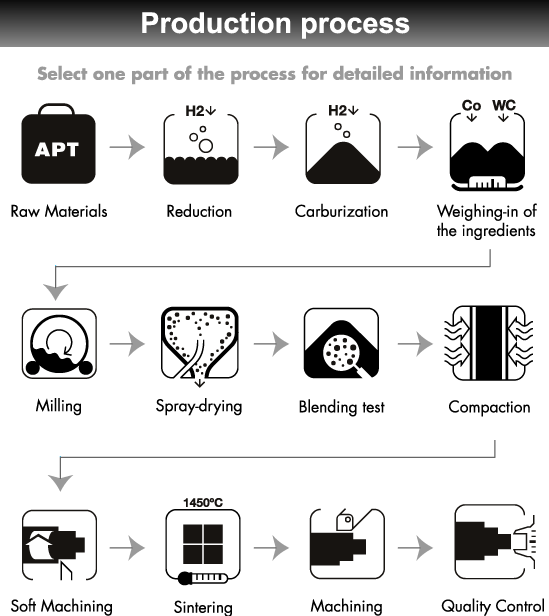Cemented Carbide - All about this material
Cemented carbide (also known as solid carbide or tungsten carbide (WC)) is one of the most successful composite engineering materials ever produced. Its unique combination of strength, hardness, and toughness satisfies the most demanding applications.
The most valuable property of cemented carbide is that it offers a safer and more dependable solution than any other known material to one of the toughest problems engineers contend with – reliability.
What is cemented carbide?
The material with staying power
Research and development in cemented carbide
Which are the most relevant attributes related to cemented carbide?
Electrical and magnetic properties
Which are the types and sizes for cemented carbide?
The cemented carbides are a range of composite materials that consist of hard carbide particles bonded together by a metallic binder.
The carbide phase is generally between 70 and 97% of the total weight of the composite. Its grain size averages between 0.4 and 10 μm.
Tungsten carbide (WC), the hard phase, together with cobalt (Co), the binder phase, forms the basic cemented carbide structure from which other types of cemented carbide have been developed. In addition to the straight tungsten carbide – cobalt compositions – cemented carbide may contain varying proportions of titanium carbide (TiC), tantalum carbide (TaC), and niobium carbide (NbC). These carbides are mutually soluble and can also dissolve a high proportion of tungsten carbide. Also, cemented carbides are produced that have the cobalt binder phase alloyed with, or completely replaced by, other metals such as iron (Fe), chromium (Cr), nickel (Ni), molybdenum (Mo), or alloys of these elements.
There are three individual phases that make up cemented carbide. In metallurgical terms, the tungsten carbide phase (WC) is referred to as the a-phase (alpha), the binder phase (i.e., Co, Ni etc.) as the b-phase (beta), and any other single or combination of carbide phases (TiC, Ta/NbC, etc.) as the g-phase (gamma). Other than for metal cutting applications, there is no internationally accepted classification of cemented carbides.
Types and sizes:
WC-Co grades
Nano, ultrafine, and submicron grades
Fine and medium grades
Medium coarse, coarse, and extra coarse grades
How is cemented carbide made?
Hyperion Materials & Technologies’ cemented carbide manufacturing process begins with the composition of a specific tungsten carbide powder mixture – tailored for the application.
The tungsten carbide powder is compacted into a form.
In a high-temperature sintering furnace, the tungsten carbide structure of the blank is shaped at precise temperatures for strictly defined periods. During this heat treatment, the tungsten carbide blank undergoes shrinkage of some 50% in volume.
The sintered cemented carbide component gains its final finish by additional grinding, lapping, and/or polishing processes.

Hyperion is continuously developing new cemented carbides. In 2017, Hyperion established a new Carbide Research & Development Center, located in the Can Tooling Competence Center in Barcelona. The R&D Center employs researchers focused on developing next generation materials, products, and process technologies. Innovations in cemented carbide include addition of unique materials to affect grain size to unique materials to affect hardness to development of Hyperion's unique sinter-HIP process.
Visit our Products pages for additional information about our cemented carbide solutions:
Toolmaker Solutions
Engineered Solutions
Hyperion Materials & Technologies is a leading manufacturer of cemented carbide solutions featured in applications and services within the areas of can making, aerospace, automotive, pump and seal, oil and gas, metal forming, metalworking, and hygiene products.
Your Hyperion salesperson can offer their expertise in selecting the cemented carbide product best suited to solve your needs.